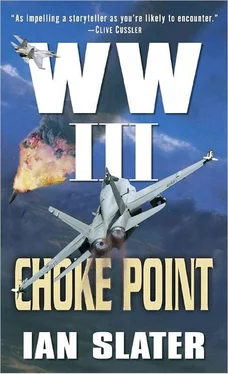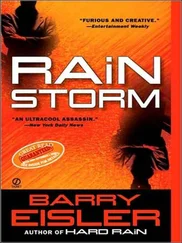To Aussie’s astonishment, he and his opponent were no more than twenty feet away from an enormous floating log, which Lewis quickly realized was the midget sub. His vision impaired by the turmoil created by the other man’s panic, Aussie grabbed at a black orb that was his opponent’s head, stabbing it repeatedly with his K-bar. Aussie’s enemy, meanwhile, charged with fear and adrenaline, was like a writhing swordfish and still dangerous. So instead of going for his heart, as ancient Greek warriors had — and would have been his preference — Aussie did it the most effective if messy way — puncturing him wherever contact could be made. He dragged his opponent under and stabbed him repeatedly, until the man’s body went limp. Exhausted, Aussie then released him, the only sound he could hear, apart from the falls, being the rapid fire of machine guns.
He’d seen a dozen or so men casting off lines from stakes that had been driven into crevices along the rock shelf in front of the cave and here and there in a crushed-shell beach just east of the rock ledge. But he couldn’t contact the RIB. He looked around for Dixon, but all he could see was the sub moving out, and beyond it, on the rocky ledge in front of the cave, a pile of discarded cardboard boxes, large sheets of torn paper, plastic wrap and assorted rubbish littering the beach, the paper alternately billowing and collapsing from phantom breezes that seemed to be coming out of the cave.
Freeman, Sal, and Choir had returned to the islet, ignobly but sensibly taking cover behind the small, jagged six-foot-long, five-foot-high rock wall. The guano that had remained undisturbed atop the wall now rose like chalk dust as the sub’s defenders—“About fourteen of ’em,” Sal told Freeman — continued to rake the rock with light and heavy machine-gun fire.
“Where the—” began Sal, his words drowned out by such an enfilade of heavy caliber and light machine-gun fire that the salt air above the small islet sang with the discordant noise of ricocheting rounds which, had it not been for the small rock wall, would have literally chopped the general and his two compatriots to pieces.
“You see Dixon or Aussie?” It was Choir, his Welsh accent always more pronounced in the taut, crackling air of a firefight.
“I don’t like this,” said Sal, in one of his more memorable understatements. “I don’t like it at all.”
Choir, crawling along on his belly, ignominiously peeked an inch or two around the end of the rock wall. “ Shite! The sub’s moving.”
“Goddammit, Sal!” bellowed Freeman, pointing to the lashed-down hump of equipment in the RIB, which slapped noisily and annoyingly against the protected sea side of the islet. “Gimme that AT!”
“Won’t stop it with that, General!” Sal said as he passed the one-shot, self-contained antitank launcher Freeman had eschewed using earlier from the islet because it would have been a wasted shot, given the impediment to his line of sight formed by the falls. He’d also known that had he tried a blind shot, the Swedish-built rocket would have exploded in transit the second its warhead struck the water wall. But now the sub’s fifty-foot-long forward section from sail to bow was nosing out beyond the edge of the waterfall.
“Got that AT round ready?” Freeman shouted, answering Salvini’s skepticism about being able to hit anything worthwhile, given the impediment of the sub. “Countdown from ten to fire!” he told Salvini and Choir.
“Ten to fire,” confirmed Sal, ready to heave up the stripped-down but still substantial M-60, the terrorists’ fire increasing, as if they had divined Freeman’s intentions. The general, his left side hugging the western edge of the islet’s rock wall, was ready to swing the AT-4 launcher around as Choir and Sal prepared, at great risk, to lay down covering fire, the enemy’s enfilade whacking loudly into the islet’s protective rock wall and surrounding water, other rounds whistling ominously overhead.
“Ten,” Freeman began, “nine, eight, seven — son of a — hold it!”
Sal, crouched, poised to come up with the M-60 firing before its folded bi-pod even had time to rest on the top of the islet’s protective wall, gave a snort of suppressed laughter. Despite the precariousness of their situation, the sub nosing out from its cliff-bottom berth behind the waterfall, and despite the worrisome fact that none of the three had seen any sign of Aussie or Dixon since the two divers had disappeared under the fall, the fact that in the middle of this murderous encounter Freeman should be so conditioned by modern technology that he stopped his countdown because his cell phone’s vibration had put him off his count struck Sal as singularly hilarious. Yet part of the reason Freeman answered the cell so promptly was that it was obviously working now, the atmospherics having improved sufficiently for communication to be reestablished.
“It might be Jensen,” said Choir, hoping the NR-1B was en route.
That the news wasn’t good from Jensen’s end was evidenced by Freeman cursing above the sound of the terrorists’ fire and the increasing bass of the midget sub’s diesel engine. “The goddamned NR-1B’s kaput !” he yelled.
“The only thing that might be available,” Jensen had told him, “is the patrol craft,” adding, “What’s all that noise?”
“A damned firefight!” Freeman bellowed, his voice whipped away by gusts that were turning the previously calm blue bay into a spindrift-veined caldron. “We’ve found the goddamned midget sub — only it’s not such a midget after all. Better send your patrol boat, send anything you’ve got — fast as you can, Admiral!” With that, Freeman gave Jensen the GPS coordinates on his cell.
“Sub’s coming through the falls, General,” Sal warned. “Bow at eleven o’clock.”
It told Freeman, still holding the AT launcher, that the bow had now moved away from its earlier two o’clock berth position to a point a hundred yards left of the islet. Which in turn told him that if he didn’t fire soon, the sub would be through, past the falls, and heading unhindered out to sea. And that the protected space behind the islet’s six-foot-high wall would then be exposed to unhindered lateral fire from the sub at virtually point-blank range.
Freeman shouldered the launcher. “Ten, nine, eight, seven, six, five, four, three, two, one …” A vicious gust punched the islet, combining with the ferocious backblast of the rocket motor as the cone-shaped 84mm warhead shot out from its fiberglass tube at sixty-four miles an hour.
Metal whacked metal, the sub’s progress so inhibited by the buckled steel basket around its prop that Freeman estimated its speed at no more than a knot. With its steering likewise affected, it was crabbing toward the eastern sandbank of a twenty-foot-wide exit channel. Choir, reading the situation as clearly as Freeman and Sal, was already in the RIB, the three warriors anticipating the consternation in the sub and preferring to take their chances in the RIB as a fast, mobile target rather than remaining on the islet. Freeman’s shot disabling the sub, ironically, had also exposed the islet as a target, should any of the terrorists mount the midget sub’s sail to pay back the Americans for their audacity.
“Where the hell’s Aussie and Dixon?” called Sal as Choir gunned the RIB, calling on all its horsepower.
“I see Dixon,” yelled Choir. “He’s stuck on that sea stack over there.” Choir indicated a stubby, Dumpster-sized, starfish-cluttered sea stack fifty yards west of them. The SEAL diver, having clung to the sea side of the stack, had now inched his way farther around it. While it didn’t afford any flat areas upon which he might rest, it was nevertheless scabrous enough with crustaceans that he had no difficulty hanging on to it out of the sub’s line of fire.
Читать дальше












